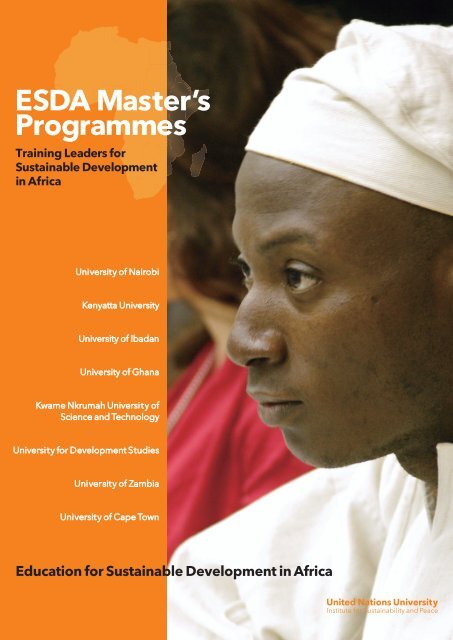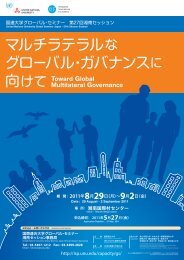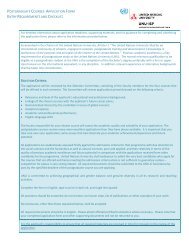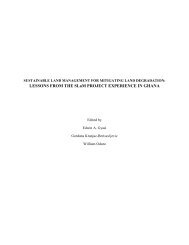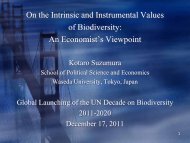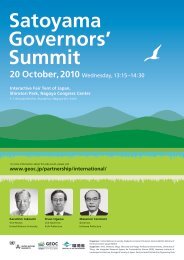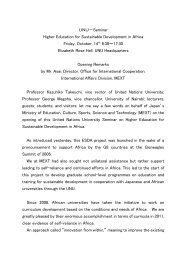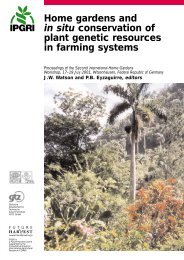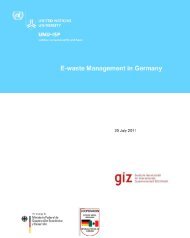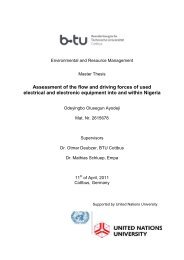ESDA Master's Programmes - UNU-ISP - United Nations University
ESDA Master's Programmes - UNU-ISP - United Nations University
ESDA Master's Programmes - UNU-ISP - United Nations University
- No tags were found...
Create successful ePaper yourself
Turn your PDF publications into a flip-book with our unique Google optimized e-Paper software.
Education for Sustainable Development in Africa (<strong>ESDA</strong>)ProgrammeMessage from <strong>UNU</strong> <strong>ISP</strong> Director 1Message from <strong>ESDA</strong> Consortium Chair 1I. Overview of the <strong>ESDA</strong>― How the programme was developed 2-3― Currents status of the programme 4― Distinguishing features of the <strong>ESDA</strong> Programme 5Ⅱ. <strong>ESDA</strong> Master’s <strong>Programmes</strong>― Sustainable Urban Development Programme 6-7― Sustainable Integrated Rural Developmentin Africa Programme 8-9― Mining and Mineral Resource Programme 10-11Ⅲ. Future vision for <strong>ESDA</strong> 12-13<strong>UNU</strong> is committed to the ideals and practices of environmental sustainability,and is an ISO140001 certified institution.All photographs in this report were contributed by<strong>UNU</strong> staff,unless otherwise indicated.Designed by INTERBOOKSPrinted in japan.Copyright ©2013 <strong>United</strong> <strong>Nations</strong> <strong>University</strong>. All Rights Reserved.
Overview of the <strong>ESDA</strong>― How the programme was developedSince October 2008, <strong>UNU</strong> Institute for Sustainability and Peace (<strong>UNU</strong>-<strong>ISP</strong>) has worked with agroup of leading African universities to explore the possibility of jointly establishing a postgraduateprogramme on sustainable development in Africa in order to shape a new generation of professionalsto face the challenges of Africa’s sustainable development, with three-year seed fundingsupport from the Japanese Ministry of Education, Culture, Sports, Science and Technology.This project, entitled ‘Education for Sustainable Development in Africa’ (<strong>ESDA</strong>), has been promotedby three Working Groups: the first on Integrated Rural Development, the second on SustainableUrban Development and the third on Management of Mineral Resources. The projectwas based on <strong>UNU</strong>’s network with higher education institutions in Africa and elsewhere which areactive in this area, including international organizations such as UNESCO, UNEP and UN-HABI-TAT. The process of implementing the project was carried out by the <strong>ESDA</strong> steering committee,which included members of African partner universities as well as cooperating universities andorganizations from Africa, Asia and Europe. After three years of solid work by the partner universitiesand institutions including UNESCO, UNEP and UN-HABITAT as well as selected Japaneseand Northern European universities, the project has developed Master’s-level education programmescovering the three areas mentioned above.ProgrammeSustainable UrbanDevelopment(SUD)<strong>University</strong><strong>University</strong> of NairobiKenyatta <strong>University</strong><strong>University</strong> of IbadanSustainable IntegratedRural Developmentin Africa(SIRDA)<strong>University</strong> of GhanaKwame Nkrumah <strong>University</strong> of Science and Technology<strong>University</strong> for Development StudiesMining and MineralResources(MMR)<strong>University</strong> of Zambia<strong>University</strong> of Cape Town2 Overview of the <strong>ESDA</strong>
― Current status of the programmeAfter the development of the three <strong>ESDA</strong> postgraduate programmes, efforts have been made byeach university to ensure that the programmes are implemented in the 2013-14 academic yearwith support from cooperating institutions. From the beginning, it has been assumed that <strong>ESDA</strong>should, upon completion of its Project Phase, transit to a new Programme Phase. Whether or notthis transition will take place successfully will depend on a host of factors, including commitmenton the part of the leadership of the African partner universities to implement the programme,readiness of the faculty members of these universities to tackle the practical requirements for theprogramme’s initiation such as working out inter-university collaboration arrangements, availabilityof technical support from principal stakeholders, as well as financial support from both localand international sources.In order to implement, monitor and evaluate the <strong>ESDA</strong> programmes, the eight African universitiesand the <strong>UNU</strong>, which co-signed the MOU for implementing the <strong>ESDA</strong> Master’s <strong>Programmes</strong>, establishedthe <strong>ESDA</strong> Consortium as a steering mechanism to: (1) consider and take necessary decisionson overall direction, strategic issues, programmes, plans, project activities, budget andother matters relating to the <strong>ESDA</strong> as a whole; (2) review the working of the <strong>ESDA</strong> Consortium,including the status of joint activities among the partner universities and of cooperation with theSupporting Organizations; and (3) to consider and agree on the calendar of activities for the<strong>ESDA</strong> <strong>Programmes</strong>. In addition, the <strong>ESDA</strong> partners have established the Next Generation ResearchersGroup – composed of young faculty members -who have elaborated a common researchagenda for joint pursuit in support of the <strong>ESDA</strong> Master’s <strong>Programmes</strong> on sustainable developmentin Africa. The group members are expected to assume a key role in implementing thefield-based and problem-solving oriented component of the <strong>ESDA</strong> curriculums.MOU signing ceremony between <strong>UNU</strong> and partnerAfrican universities on 13 Oct 2011, from left:Prof. George Magoha, Vice-Chancellor, <strong>University</strong>of Nairobi; Prof. Olive Mugenda, Vice-Chancellor,Kenyatta <strong>University</strong>; Prof. Konrad Osterwalder,Former Rector, <strong>UNU</strong>; Prof. ErnestAryeetey, Vice-Chancellor, <strong>University</strong> of Ghana;Prof. Stephen Simukanga, Vice-Chancellor, <strong>University</strong>of Zambia.Table of MilestonesOct. 2008 – Apr. 2009 May 2009 – Jun. 2010Project Initiation andConceptualizationProgramme Developmentand Planning PhaseJul. 2010 – Jul. 2011Programme Testing andSynthesis Phase4 Overview of the <strong>ESDA</strong>
― Distinguishing features of the <strong>ESDA</strong> ProgrammeThe <strong>ESDA</strong> Programme is characterized by a numberof unique and innovative features, which may besummarised as follows:(1) Programme ownership by leading African universitiescollaborating for impact: The <strong>ESDA</strong> Programmehas been carried out by a group of likemindedAfrican universities which are intent uponestablishing a common postgraduate programmeon sustainable development in Africa.(2) Improving the existing postgraduate programmesof partner universities rather than creatinga totally new programme: The <strong>ESDA</strong> Programmehas created concrete modalities for inter-universitysharing of complementary strengths among thepartner universities in order to enrich the existingprogrammes of the respective universities with improved curricular construct and enhanced instructionalcapacity.(3) Emphasis on field-oriented programmes designed to strengthen problem-solving capacitiesand inter-personal work skills of postgraduate students: One major shortcoming of the existingprogrammes in many African universities is that they are heavily focussed on classroom or desklevellearning with only limited practical exposure to developmental reality in a community or industrysetting. The <strong>ESDA</strong> Programme has attempted to alter this by instituting learning programmeswhich will bring postgraduate students to the field to address practical issues that relateto sustainable development concerns in each setting.(4) Active support by <strong>UNU</strong> and other external partner universities as well as UN organizationsworking in the field of sustainable development: As the project’s initiator, <strong>UNU</strong> has provided substantiveand organizational support for the <strong>ESDA</strong> Project. The Project has also benefited from activesupport by external partner universities, especially in Japan and Northern Europe, and UNorganizations such as UNESCO, UNEP and UN-HABITAT, all of whom have long experience andmuch expertise in education and training in the field of sustainable development.(5) Intentional use of Information and Communication Technology (ICT): African universities participatingin the <strong>ESDA</strong> Project are at various stages of development in utilising ICT for their researchand education. In order to promote inter-university collaboration among the partner universitiesthe Project has made deliberate use of this technology.(6) A project designed not only for African students, but also for students from outside Africa whoare interested in contributing to sustainable development in Africa: When implemented, the programmesformulated by the <strong>ESDA</strong> Project will not only be open to the students at the partner universities,but also to students from other African universities willing to enrol in one of the partneruniversities.<strong>ESDA</strong> ReflectionSymposium/Workshopof the <strong>ESDA</strong>Project on 1-2 March2010 in Nairobi.Oct. 13-14 , 2011 Nov. 2011 - Aug. 2013 Aug. Sep. 2013-Project completionconferencePreparatory work forProgramme initiationImplementation of the <strong>ESDA</strong>Programme in African PartnerUniversitiesOverview of the <strong>ESDA</strong>5
and shall be covered in a minimum of four (4) and a maximum of eight (8) semesters of 15 weekseach● Each candidate in the programme shall be required to successfully take fifteen (15) taught courseunits, comprising eleven (11) core course units and four (4) specialization units. The three optionsof water and sanitation development, food and nutrition security and renewable energy representthe electives dimension of this course. In addition, candidates shall be required to undertake:• An internship programme lasting a minimum of two (2) months and a maximum of three (3)months between the end of the first year of study and the beginning of the second year.• A mandatory innovation-based research project equivalent to four (4) course units and shallsubmit their chosen research topics for approval by the Department a month after theinternship programme.• Each course unit shall have a minimum of sixty (60) contact hours, and shall be coveredwithin a semester.“To me, <strong>ESDA</strong> means Education for Smart development in Africabecause learners will be spending 60% of their time in the field andwill be using a problem solving, action oriented and participatoryapproach to address the un-sustainable urban development issues.”(Mr. Josiah Omotto- UMANDE TRUST )“ I am eager to see how the course characteristic of 60% Fieldwork and 40% theory will be implemented, I am also impressed onhow the course brought on board different professions from differentfields to work together in addressing Sustainable Developmentissues in the region as a whole”. (Prof. Patts Odira, UoN)top:<strong>ESDA</strong>-SUD Facilitators and students interacting with Kibera communitymembers during the pilot testing of the Programme. (March 2011)bottom:Urban agriculture plays an important role in food and nutrition security andtakes many forms in urban areas for example the vertical gardens shownin the photo above taken in Kibera, Nairobi in February, 2011. The programmewill look at challenges and opportunities of urban agriculture.Comment from Prof. David Mungai (<strong>University</strong> of Nairobi)The <strong>ESDA</strong>-SUD programme lays significant emphasis on re-tooling of teachingmethodologies so as to shift from hitherto largely theoretical to a more practical andcontextualized approach to academic and research training. Research and developmentwill involve local communities through participatory methods and bottom-up developmentapproaches. This is reflected by the amount of time the students and their lecturers willspend in the field, laboratories and studio performing various tasks related to the differentcourses. This will be reflected in the final grading where the practical segment, includingthe mandatory internship, will carry greater weight. The use of ICT in teaching will make itpossible to tap expertise from across the world.<strong>ESDA</strong> Master’s <strong>Programmes</strong>7
― SUSTAINABLE INTEGRATED RURAL DEVELOPMENTIN AFRICA PROGRAMMEProgramme aim:The Sustainable Integrated Rural Development in Africa Programme seeks to impart in practicalways the knowledge and skills required for reducing poverty and improving human living conditionsin rural Africa. This two years training-of-trainers Master’s Degree programme in four WestAfrican universities targets actual or potential rural development practitioners. A PhD componentin the <strong>University</strong> of Ghana aims at developing the critical instructional mass for sustaining theprogramme.Degree awarded:Master’s in Sustainable Integrated Rural DevelopmentInstitutions offering the degree:<strong>University</strong> of Ghana, Legon, <strong>University</strong> for Development Studies, Tamale, and Kwame Nkrumah<strong>University</strong> of Science and Technology, Kumasi, in Ghana; <strong>University</strong> of Ibadan, Ibadan, NigeriaDate of programme initiation:August/September, 2013Length of study:two yearsNumber of student intake (per year):Initially up to 10 students at each universityProgram description (including target students, unique curricular features, participatingfaculties & departments)SIRDA is designed for parallel implementation by the following West African universities:• <strong>University</strong> of Ghana (UG), through its Department of Geography and Resource Development• <strong>University</strong> for Development Studies (UDS, Ghana), through its Department of Extension• Kwame Nkrumah <strong>University</strong> of Science and Technology (KNUST, Ghana), through its Bureauof Integrated Rural Development as all in Ghana• <strong>University</strong> of Ibadan (UI, Nigeria), through its Centre for Sustainable Development.Uniqueness of the programme lies in its innovative combination of the following into a unified ruraldevelopment training strategy:• Holistic perspective• Integrated multidisciplinary methodology• Endogenous approaches• Participatory community-based field-oriented work• Built-in capacity to generate employment for university graduates and rural youth.Programme emphasis upon practical training through application of appropriate developmenttheories will:a) Generate positive synergies between the theories and practical experiencesb) Enhance the capacity of graduates and the rural communities for self-employment andengagement in the public sector.8 <strong>ESDA</strong> Master’s <strong>Programmes</strong>
Courses comprise core ones focused on solidifying theoretical andmethodological foundations, and elective ones categorized into environmental,economic/livelihood, and social, which are more practiceoriented.They are taught in an interdisciplinary fashion by instructorsdrawn from the Faculties of Social Science, Agriculture and Science,and from other relevant academic units of the implementing universities.The teaching involves collaboration with external experts.In the first year, admission to the programme may be limited to5-10 candidates per university.Structure of CurriculumThe programme comprises approximately 25 courses, includingabout 12 core ones mainly of a theoretical and methodological charactersuch as:• Theories and Policies of Development with special reference to rural Africa• Community-Resident Practical Training in Integrated Participatory Rural Development• InternshipThe rest are electives of a more practical nature, which are categorized into:• Environmental, such as Waste Management• Economic/Livelihood, such as Alternative Income Generating Activities• Social, such as Gender and Rural Development.To qualify for the degree, a candidate must pass all the core courses including seminars and thesis,plus an optional one taken from any of the three elective categories.top:Prof. Gyasi relatingto workshop participantsnear Aburitown, en route to aSLaM project area, aprospective localityfor ProIRD fieldworkin Akuapem district,cradle of Ghana’scocoa industry.bottom:Discussion and evaluationafter inspectionof agrodiversefarm.Pedagogy involves: student-centred approach; conventional face-to-face classroom methods;modular presentations; laboratory work; field demonstrations; group discussions; attachment;digital education modes including interactive TV/Video and website/online platforms.Performance assessment methods include term papers, seminar presentations, and end ofsemester examination. Evaluation by external examiners and reviewers and by students andtheir instructors alike would ensure quality.Comment from Prof. Edwin Gyasi (<strong>University</strong> of Ghana)The central characteristic feature of SIRDA is its departure from conventionalpostgraduate programmes by the emphasis placed upon practical training through theapplication of relevant theories and models to address real environmental, economic, andsocial factors (e.g., land degradation, poor entrepreneurial opportunities, and genderbiases) that condition the poverty and constrain sustainable development in rural Africa. Afurther distinguishing feature is the interdisciplinary, people-centred, participatory, andcommunity-based approaches. Others include the emphasis upon field demonstrationsand hands-on training through internship, and the parallel programme implementation byfour separately located universities with the collaboration of other institutions, to enhancesynergies and spatial, environmental, economic and social impacts.<strong>ESDA</strong> Master’s <strong>Programmes</strong>9
― MINING AND MINERAL RESOURCES PROGRAMMEProgramme aim:This programme aims to provide a postgraduate qualification that highlights the critical factorsof sustainable development in the context of mining and minerals processing in Africa; includingan understanding of, and a sensitivity and progressive approach to, managing and interactingwith communities, environmental challenges, safety cultures, health-related issues andregulatory frameworks.Degree awarded:Master of Philosophy specialising in Sustainable Mineral Resource DevelopmentInstitutions offering the degree:<strong>University</strong> of Cape Town (UCT), Cape Town, South Africa and <strong>University</strong> of Zambia (UNZA),Lusaka, ZambiaDate of programme initiation:January 2014Length of study:two yearsNumber of student intake (per year):15 to 20 students at each universityProgram description (including target students, unique curricular features, participatingfaculties & departments)The Master of Philosophy (MPhil) specialising in Sustainable Mineral Resource Developmentwill be delivered on a decentralised basis by the <strong>University</strong> of Cape Town (UCT) and the <strong>University</strong>of Zambia (UNZA), based upon a common set of courses and a common cohort of students.Dynamic interaction between students is regarded as a core element of the programme.Target students include professionals working in and around the mining and minerals industry,from geologists, engineers, planners, strategists, lawyers and regulators to health professionals,environmental officers, safety specialists and social scientists. The basic entry requirementis a four-year Bachelor’s degree or an Honours degree in any relevant field. Participating facultiesand departments include the Sustainability Institute at the <strong>University</strong> of Stellenbosch, theGraduate School of Business and the Chemical Engineering Department at the <strong>University</strong> ofCape Town and the School of Mines at the <strong>University</strong> of Zambia. Courses will be attended bythe entire cohort of students, with individual assignments presented via structured webinarsessions. A unique feature of the programme is the internship, which will give students the opportunityto see the industry from another perspective. The research dissertation is aimed atdeveloping knowledge at an advanced level in and around the African mining industry.Structure of CurriculumThe curriculum comprises four courses with a total value of 60 credits, and a research dissertationwith a value of 120 credits. The courses will be delivered in blocks of approximately oneweek each within the first year of study, and include:• Sustainable Development (convened by the Sustainability Institute, <strong>University</strong> of Stel lenbosch)• Strategic Social Engagement Practice (Graduate School of Business, UCT)• Research Methodology and Communication (Department of Chemical Engineering,UCT)10 <strong>ESDA</strong> Master’s <strong>Programmes</strong>
• Environmental Stewardship in Mining and Minerals Beneficiation (Schoolof Mines, UNZA)Students will also complete an internship within an appropriate host organisation,to engage with knowledge and practices outside of their normal disciplinaryboundary. Students must make a meaningful contribution to a project of the hostorganization, and produce a reflective report.The research dissertation will be convened at the <strong>University</strong> at which the studentis registered and will be supervised jointly by academics from different researchdisciplines and/or groupings.A student working on aphysical model of a coalwashing plant at <strong>University</strong>of Cape Town.<strong>ESDA</strong> representatives at the Mogalakwena mine in South Africa.Comment from Prof. Francis Petersen (<strong>University</strong> of Cape Town)At the African Mining Indaba in February 2013, Mark Cutifani, CEO of Anglo American,said, “we have to think beyond (...) being an ‘Extractive Industry’ (...) we areoverwhelmingly a ‘Development Industry’ that creates new social possibilities. We shouldbe the ‘Development Partner’ that supports and catalyzes the creation of wealth for all.”This is the same message that the new Master of Philosophy programme in SustainableMinerals Resource Development, developed collaboratively by UCT and UNZA over thepast four years through the <strong>ESDA</strong> initiative, aims to deliver to its graduates, thusproducing a new generation of ethical leaders and practioners for the resource-basedindustries.<strong>ESDA</strong> Master’s <strong>Programmes</strong>11
Future vision for <strong>ESDA</strong>After four years of collective developmental work by eight African Partner Universities and <strong>UNU</strong>-<strong>ISP</strong>, <strong>ESDA</strong> now has three Master’s <strong>Programmes</strong> ready for implementation: namely, ‘SustainableUrban Development’, ‘Sustainable Integrated Rural Development in Africa’ and ‘Mining and MineralResources’. The faculties and administrations involved have been preparing the ground at theirrespective universities for actually initiating the programmes, including securing the approval ofthe <strong>University</strong> Senate, working out the curricular details, filling in the staffing tables, lining up thesyllabi, arranging guidelines and templates for administrative procedures, coordinating preparatorysteps with partner universities in the same thematic programme, and preparing programme announcementsboth in and outside the respective universities. As the real work for postgraduate instructionis about to start for <strong>ESDA</strong>, it is opportune to ponder the challenges and opportunitieswhich may lie ahead. This discussion is presented within the time frames of ‘the first two years’,‘the next three years’ and ‘ten years from now’, so that it may constitute a ‘future vision’ for <strong>ESDA</strong>.The First Two Years: Programme Establishment PhaseThe first two years of any new academic programme are filled with challenges, most of all for programmeestablishment. The immediate task for the <strong>ESDA</strong> partner universities is to commence thethree Master’s programmes and keep them running so that the first cohort of students will graduatein two years as planned, having benefited from all the promised features of the programmes.This will pose at least three challenges that need to be faced on a priority basis.The first challenge concerns the need for the partner universities offering the same Master’s Programmeto establish an effective and efficient working arrangement for inter-university communicationand coordination, encompassing both joint execution of academic instruction and shared administration.This will require joint elaboration of rules, guidelines and procedures and agreement ondecision-making modalities. No doubt, the close teamwork developed among the participating facultyduring the programme preparation phase will continue to play a pivotal role in facilitating this task.However, this alone is not sufficient. Establishment of a well-functioning inter-university communicationmechanism will demand considerable front-end investment in creating appropriate ICT environmentsin each institution, including not only the physical facilities but also human capacity for utilisingit, such as for e-learning and e-teaching. External support in this domain will be of critical importance.The second challenge concerns implementation of the field-based and problem-solving orienteddesign of the curricular programmes, which is the distinguishing feature of <strong>ESDA</strong>. An <strong>ESDA</strong> InternshipProgramme has already been designed as part of the preparatory work, with the financialsupport of the African Development Bank (AfDB). The programme will enable the studentsenrolled in <strong>ESDA</strong> Master’s <strong>Programmes</strong> to be exposed to the developmental reality through fieldtrips to rural villages, informal urban settlements, mining communities and industrial areas. Theaccompanying faculty will also gain opportunities to interact with local communities as well as acquirenew research insights. Implementation of the internship programme will require considerablefunding, and AfDB has expressed interest to finance the programme. The <strong>ESDA</strong> secretariatis working with AfDB to develop the modalities of this financial support.The third challenge concerns recruitment of students. The single most desired outcome of the first twoyears of the programme establishment phase will be a situation in which the <strong>ESDA</strong> <strong>Programmes</strong> havebecome known and are selected for attendance by students who have the potential to lead Africa’ssustainable development. In order to achieve this outcome, and also to provide wide access to entryregardless of financial and other backgrounds of the applicants, <strong>ESDA</strong> should set up a scholarshipprogramme to provide financial support to as many as possible of the 115 students who will be enrolledin its three programmes combined every year. The <strong>ESDA</strong> Secretariat is making a concentratedeffort to solicit external support for establishing such a scholarship programme.12 Future vision for <strong>ESDA</strong>
The Next Three Years: Programme Improvement PhaseIf <strong>ESDA</strong> successfully manages the Programme Establishment Phase in the first two years, itshould subsequently prepare for a Programme Improvement Phase in the next three years.While improvement will no doubt be needed on all fronts, two foreseeable challenges should benoted for the potential long-term impact of <strong>ESDA</strong> <strong>Programmes</strong> and, as such, for early attentioneven from the Programme Establishment Phase. The first challenge concerns promotion of fieldresearch by <strong>ESDA</strong>’s Next Generation Researchers (NGR), and the other relates to organisationof a career support system for <strong>ESDA</strong> graduates.<strong>ESDA</strong> has already established a Next Generation Researchers team, consisting of eight youngfaculty members nominated by the respective partner universities, whose task is to conduct ES-DA-wide joint research, especially to enrich and support the educational content of the Master’s<strong>Programmes</strong>. NGR members are expected to spearhead application of the field-based problemsolvingapproach through their research. Their work should lead not only to generation of theoreticalstudies and case analysis for instructional use in classrooms, but also to provision of practicaladvice and technical support to the communities covered in the research. In addition, the groupshould work toward teaming up with other young faculty members and next generation researchgroups from africa and outside Africa to expand outreach in field-based research activities forsustainable development. In the Programme Improvement Phase, NGR members should be encouragedto promote integration of their research, education and community service activities sothat they may serve as a model for the role of universities in sustainable development.<strong>ESDA</strong> will start graduating more than 100 Master’s degree holders a year from the beginning ofthe Programme Improvement Phase. The employability of these graduates should be regardedas an important indicator of the success of the programmes. Establishment of a Career SupportSystem for students and graduates will constitute a critical task during this phase.Ten Years From Now: An Open and Wider <strong>ESDA</strong>In this age of rapid changes it is perhaps useless to speculate how <strong>ESDA</strong> will look after 10 years.However, one thing is certain: if <strong>ESDA</strong> continues to operate more or less according to the presentdesign, it will have instructed and graduated more than 1000 young people aspiring to work forAfrica’s sustainable development. The experience accumulated in the process of inter-universityinteraction and social engagement will, no doubt, make <strong>ESDA</strong> a more open entity than it is now. Ifit manages to establish a Career Support System that tracks its graduates and keeps contact withthe employers of these graduates, <strong>ESDA</strong>’s reach will definitely be wider than it is now. If the groupof more than 1000 graduates works and behaves with the awareness of Africa’s developmentalreality and the commitment to its improvement that the <strong>ESDA</strong> <strong>Programmes</strong> will attempt to installin them, <strong>ESDA</strong>’s impact will certainly be deeper than in the first two years or the next three years.<strong>ESDA</strong>’s NGR team should be there to oversee the entirety of this process.From left, Prof. Nagao Masafumi, Project Professor, Global LeadershipInitiative, Graduate Program in Sustainability Science GraduateSchool of Frontier Sciences, <strong>University</strong> of Tokyo, Advisor, <strong>UNU</strong>-<strong>ISP</strong>, Dr.David M. Malone, Rector, <strong>UNU</strong>, Dr. Boukary Savadogo, Manager, Education,Science & Technology Division, Human Development Department,African Development Bank, Dr. Donald Kaberuka, President, AfricanDevelopment Bank, Prof. William Otoo Ellis, Vice Chancellor,Kwame Nkrumah <strong>University</strong> of Science and Technology, and the personnext to Emmanuel is Prof. Stephen Simukanga, Vice Chancellor,<strong>University</strong> of Zambia, Dr. Emmanuel Mutisya, Researcher, <strong>UNU</strong>-<strong>ISP</strong>.Future vision for <strong>ESDA</strong>13
<strong>United</strong> <strong>Nations</strong> <strong>University</strong>Institute for Sustainability and Peace5-53-70 Jingumae, Shibuya-ku, Tokyo150-8925, JapanTel: (+81) 3 5467 1212; Fax: (+81) 3 3499 2828<strong>UNU</strong>-<strong>ISP</strong> Homepage: http://isp.unu.edu/


